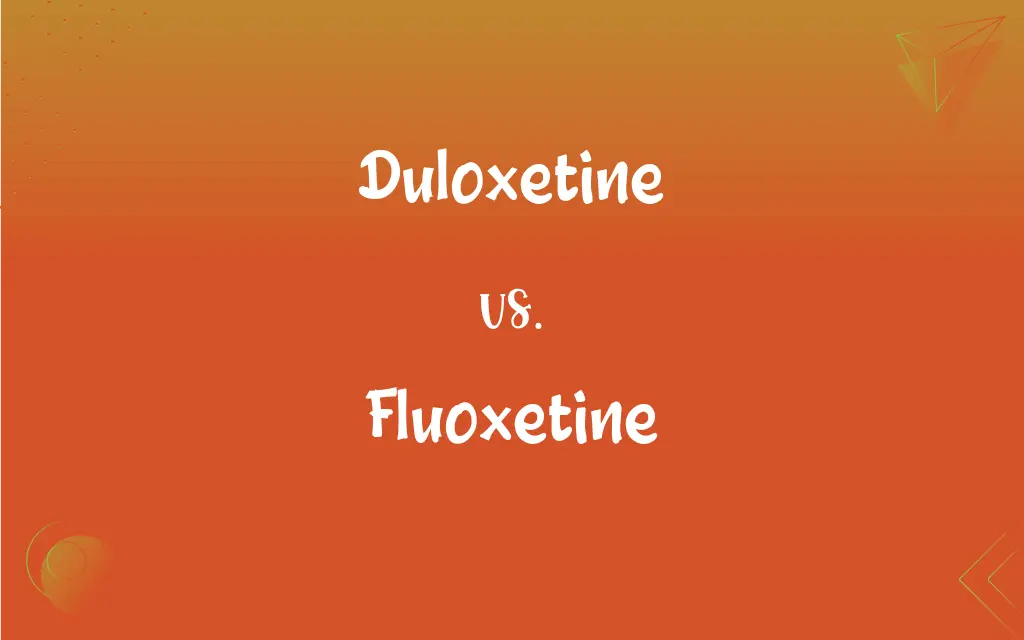Duloxetine vs. Fluoxetine: What's the Difference?
By Janet White || Published on January 13, 2024
Duloxetine is a serotonin-norepinephrine reuptake inhibitor (SNRI) for depression, anxiety, and pain, while fluoxetine is a selective serotonin reuptake inhibitor (SSRI) mainly for depression and OCD.

Key Differences
Duloxetine, an SNRI, is used to treat major depressive disorder, general anxiety disorder, and chronic pain conditions. Fluoxetine, an SSRI, is primarily used for treating depression, obsessive-compulsive disorder, and panic attacks.
Duloxetine works by balancing serotonin and norepinephrine in the brain, helping alleviate pain and mood symptoms. Fluoxetine targets serotonin levels in the brain, aiding in mood improvement and anxiety reduction.
The side effects of duloxetine can include nausea, dry mouth, and dizziness. Fluoxetine's side effects often include sleep disturbances, sexual dysfunction, and nervousness.
Duloxetine is also prescribed for diabetic neuropathy and fibromyalgia pain management. Fluoxetine is additionally used for treating bulimia nervosa and premenstrual dysphoric disorder.
Both medications require careful dosage adjustment and monitoring, especially when starting or changing doses. Discontinuation of either duloxetine or fluoxetine should be gradual to prevent withdrawal symptoms.
ADVERTISEMENT
Comparison Chart
Class of Drug
Serotonin-norepinephrine reuptake inhibitor (SNRI).
Selective serotonin reuptake inhibitor (SSRI).
Primary Uses
Depression, anxiety, chronic pain.
Depression, OCD, panic disorder.
Side Effects
Nausea, dry mouth, dizziness.
Sleep disturbances, sexual dysfunction.
Additional Uses
Diabetic neuropathy, fibromyalgia.
Bulimia nervosa, premenstrual dysphoric disorder.
Withdrawal Management
Gradual dose reduction recommended.
Gradual discontinuation to avoid withdrawal symptoms.
ADVERTISEMENT
Duloxetine and Fluoxetine Definitions
Duloxetine
A drug used for chronic pain relief.
Duloxetine helped alleviate his diabetic neuropathy pain.
Fluoxetine
An SSRI for mood disorders.
Fluoxetine regulates serotonin levels in the brain.
Duloxetine
An SNRI affecting brain chemicals.
Duloxetine balances serotonin and norepinephrine.
Fluoxetine
A medication for treating depression.
Fluoxetine was effective in managing his depression.
Duloxetine
An antidepressant medication.
Duloxetine was prescribed to her for depression.
Fluoxetine
A treatment for panic attacks.
Fluoxetine helped reduce the frequency of his panic attacks.
Duloxetine
Used in fibromyalgia management.
Duloxetine is part of her fibromyalgia treatment plan.
Fluoxetine
Used for obsessive-compulsive disorder.
Her OCD symptoms lessened with fluoxetine.
Duloxetine
A treatment for anxiety disorders.
Her anxiety symptoms improved with duloxetine.
Fluoxetine
Prescribed for bulimia nervosa.
Fluoxetine is part of her treatment for bulimia.
Duloxetine
A drug of the SNRI class, C18H19NOS, used in its hydrochloride form to treat depression, anxiety, fibromyalgia, and diabetic neuropathy.
Fluoxetine
A drug of the SSRI class, C17H18F3NO, used in its hydrochloride form to treat depression, obsessive-compulsive disorder, panic disorder, premenstrual dysphoric disorder, and certain eating disorders.
Duloxetine
(pharmaceutical drug) A drug that functions as an SNRI and is administered orally in the form of its hydrochloride C18H19NOS·HCl especially to treat depression, anxiety, and chronic pain (such as that associated with fibromyalgia and peripheral neuropathy). It is marketed under the trademark Cymbalta.
Fluoxetine
(pharmaceutical drug) A synthetic compound which inhibits the uptake of serotonin in the brain and is taken to treat depression.
Fluoxetine
A selective-serotonin reuptake inhibitor commonly prescribed as an antidepressant (trade name Prozac)
FAQs
Are there common side effects of duloxetine?
Yes, like nausea and dry mouth.
Is duloxetine safe for everyone?
It requires a doctor's assessment, as it's not suitable for everyone.
Are there side effects to fluoxetine?
Yes, including sleep disturbances and sexual dysfunction.
What is duloxetine used for?
Treating depression, anxiety, and chronic pain.
Can duloxetine treat fibromyalgia?
Yes, it's often prescribed for this condition.
How does fluoxetine function?
By increasing serotonin levels in the brain.
Is fluoxetine safe for long-term use?
It can be, under medical supervision.
How long does it take for fluoxetine to work?
Effects can be seen in 4-6 weeks.
Can fluoxetine help with eating disorders?
Yes, it's used for treating bulimia nervosa.
How does duloxetine work?
It balances serotonin and norepinephrine in the brain.
What does fluoxetine treat?
Depression, OCD, and panic disorder.
Is duloxetine addictive?
No, but it should be used as prescribed.
Can duloxetine and fluoxetine be taken together?
Only under a doctor's advice.
Is alcohol safe with duloxetine?
Alcohol can increase certain side effects.
Can fluoxetine affect sleep?
Yes, it can cause sleep disturbances.
Can fluoxetine be used in children?
Yes, but under strict medical guidance.
How is duloxetine dosed?
It varies, based on the condition and patient.
Can fluoxetine cause weight changes?
Yes, it can cause weight loss or gain.
Does duloxetine cause withdrawal symptoms?
Yes, if stopped abruptly.
Are duloxetine and fluoxetine safe during pregnancy?
They require a doctor's evaluation for use during pregnancy.
About Author
Written by
Janet WhiteJanet White has been an esteemed writer and blogger for Difference Wiki. Holding a Master's degree in Science and Medical Journalism from the prestigious Boston University, she has consistently demonstrated her expertise and passion for her field. When she's not immersed in her work, Janet relishes her time exercising, delving into a good book, and cherishing moments with friends and family.






































































